New Faculty 2016-2017
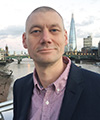
Dan Bergstralh
Assistant Professor of Biology
Dan Bergstralh joins the University after postdoctoral work at the University of North Carolina and the University of Cambridge. Using multiple model systems, he explores the biology of epithelia, the most common type of tissue in the human body. Specifically, his lab is interested in how epithelial cells divide and in how they adhere to one another. By exploring the relationship between division and adhesion, the lab aims to understand how epithelial tissues are built during development and maintained over the lifespan of the organism.
In addition to his postdoctoral appointment at Cambridge, he held a Marshall Sherfield Fellowship, a Marie Skłodowska-Curie (European Commission) Fellowship, and a Research Fellowship at Clare Hall College. An undergraduate at the University of Maryland, Bergstralh undertook predoctoral training at the National Institutes of Health.
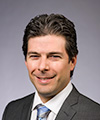
Jaime Cardenas
Assistant Professor of Optics
Jaime Cardenas joins the faculty after an appointment as a research scientist at Columbia University. He also worked in the Cornell Nanophotonics Group, beginning in 2007, with research in integrated photonics, silicon photonics, and materials for photonics.
At Rochester, Cardenas will form a research group to focus on next-generation photonic devices integrated on a chip using novel 2-D materials. The group will work on technological problems that prevent integrated photonics from becoming mainstream in consumer applications and enabling integrated photonics to enhance scientific discovery in fields such as astronomy, biomedicine, sensing, and quantum communications.
Cardenas has participated and led workshops at the Cornell Center for Teaching Excellence. His teaching experience includes mentoring of graduate students, instruction of device testing, teaching of microfabrication techniques, a non-calculus physics lab, and quantum mechanics.

Gilbert (Rip) Collins
Professor of Mechanical Engineering
Gilbert (Rip) Collins joins Rochester from Lawrence Livermore National Laboratory, where he was the director of the Center for High Energy Density Physics and a Distinguished Member of the lab’s technical staff.
He leads a multidisciplinary group of scientists, postdoctoral researchers, and students to explore fundamental properties of matter at extreme densities, the microphysics of fusion, and other areas. His work on matter at high-energy density has applications in planetary science, stellar evolution, and controlled fusion. He will lead an increasingly important area at Rochester, exploring the behavior of matter under extreme pressure.
Among many honors, Collins is a fellow of the American Physical Society and has received the APS award for Excellence in Plasma Physics and the U.S. National Nuclear Security Administration Award for Excellence for Stockpile Stewardship Program. He has appeared on television and radio shows (e.g., Discovery Channel; History Channel; National Geographic Channel series, Cosmos) describing extreme matter, planetary science, and fusion science.
He held a visiting professorship at Imperial College and was a visiting scientist at the University of Edinburgh. At Rochester, he holds secondary appointments as a professor of physics and astronomy and a senior scientist at the Laboratory for Laser Energetics.
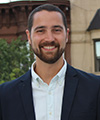
Thomas Fleischman
Assistant Professor of History
Thomas Fleischman joins the faculty after postdoctoral appointments in Yale University’s Agrarian Studies Program, as visiting assistant professor at Bowdoin College, and as writer-in-residence at New York University’s Jordan Center for the Study of Russia.
Environmental history, the history of state socialism, economic history, the history of modern Germany, and the history of animals all intersect in Fleischman’s work. His forthcoming book, Three Little Pigs: East Germany’s ‘Green’ Revolution, 1945–2000, focuses on East Germany’s decision in the 1970s to develop a large-scale pork industry, which culminated in an environmental disaster. Fleischman argues that practices of industrial agriculture in state socialist and capitalist economies were very similar and led to parallel environmental problems.
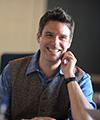
Gregory Heyworth
Associate Professor of English
Gregory Heyworth joins the faculty from the University Mississippi, where he has taught since 2001.
Heyworth is the founder (2010) and director of the Lazarus Project, a nonprofit initiative to recover damaged cultural heritage objects using imaging technologies. The Lazarus Project has digitally restored scores of damaged works and objects in libraries and collections around the world, including the Vercelli Book and the Martellus Map, and has launched major multispectral digitization projects in Chartres, France; Tblisi, Georgia; and Vercelli, Italy.
Heyworth has published and lectured extensively on medieval literary criticism and on his work with the Lazarus Project. His major publications include a monograph, Desiring Bodies (Notre Dame, 2009), and a critical edition, Les Eschéz d’Amours, with Daniel O’Sullivan (Brill, 2013). He currently is preparing a publication, Textual Science and the Future of the Past, with Roger Easton of Rochester Institute of Technology. A work of intellectual history and a practical introduction to the latest technologies and techniques of textual recovery, the book will explore topics such as codicology; paleography; imaging techniques and processing; and the history of the book, manuscripts, and textual science. Heyworth’s digital research has been funded by the National Center for Preservation Technology and Training and the National Endowment for the Humanities.
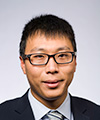
Pengfei (Frank) Huo
Assistant Professor of Chemistry
Pengfei (Frank) Huo joins the tenure-track faculty at the University after serving as a visiting assistant professor of chemistry at Rochester for the past year. Frank’s PhD work focused on developing efficient and accurate theoretical methods to better understand energy transfer processes in the natural light harvesting systems that perform photosynthesis.
In 2012, he was appointed a postdoctoral researcher at the California Institute of Technology, where he simulated the dynamics of electron and proton transfer mechanisms in catalysts that are used to produce fuels from sunlight. He was recognized as one of the top reviewers for the Journal of Chemical Physics (2012) and received an ACS PHYS Division Postdoctoral Research Award (2014).
At Rochester, Huo will lead a group to investigate the complex chemical and molecular dynamics associated with harvesting and storing solar energy. The group’s primary interests include the charge transfer dynamics in organic photovoltaic devices; the coupled transfer of electrons and protons in photo-catalytic systems; and research to active small molecules as a more efficient source for solar energy storage.
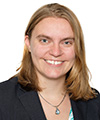
Kathryn Knowles
Assistant Professor of Chemistry
Kathryn Knowles joins the Rochester faculty after completing work at the University of Washington as an Energy Efficiency and Renewable Energy Postdoctoral Research Fellow. In that appointment, she studied luminescent semiconductor nanocrystals and their application to solar energy.
Knowles plans to establish an interdisciplinary research program focused on investigating the fundamental properties of nanoscale materials and their interactions with light. Initial projects will involve the synthesis and development of mixed-metal oxide semiconductor nanomaterials, a diverse class of materials with optical, electronic, and magnetic properties that vary widely depending on their composition. In addition to exploring the rich chemistry and physics of such materials, Knowles aims to exploit their potential as cheap and efficient alternatives to expensive and precious metal catalysts for photocatalytic applications and especially those relevant to solar fuels production.
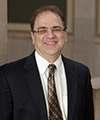
Narayana Kocherlakota
Lionel W. McKenzie Professor of Economics
Narayana Kocherlakota joins the faculty as the Lionel W. McKenzie Professor of Economics. As a leader of a recent economic analysis on taxation and social insurance called the New Dynamic Public Finance (also the title of his 2010 book published by Princeton University Press), Kocherlakota asks how best to design social insurance or redistribution systems while maintaining incentives for individuals to work and save. The field was essentially launched with an article coauthored by Kocherlakota along with Mikhail Golosov and Aleh Tsyvinski in 2003.
He has made a number of other significant contributions in areas of economic inquiry such as financial and monetary economics. His current research focuses on how the existence of a lower bound on (nominal) interest rates influences monetary policy and macroeconomic outcomes.
Kocherlakota served as the president and CEO of the Federal Reserve Bank of Minneapolis from 2009 to 2015. His earlier academic appointments include professorships at Stanford University and the University of Minnesota. He was elected a fellow of the Econometric Society and has handled editorial duties at several journals in economics, including Review of Economic Studies, Quarterly Journal of Economics, Journal of Economic Theory, and Theoretical Economics.
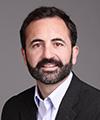
Edmund Lalor
Associate Professor of Biomedical Engineering and Neuroscience
Edmund Lalor joins the faculty from Trinity College Dublin, Ireland, where he was an assistant professor from 2011 to 2016. Prior to that, he was a postdoctoral research associate at University College London, Trinity College Dublin, and the Nathan Kline Institute for Psychiatric Research.
Lalor’s research interests center on how the human brain selects and encodes information from the many signals we sense in everyday life. Using approaches that combine innovative experimental design with sophisticated signal processing, he has made important contributions to understanding how neural signatures of natural speech processing reflect the encoding of specific speech features and how that processing is affected by attention and visual input. He has also developed novel methods for decoding brain signals for use in brain-computer interfaces and for investigating the specificity of sensory processing deficits in psychiatric and developmental disorders.
Lalor has taught courses on neural signal processing and electronic circuits and design to biomedical and electrical engineers and to neuroscientists. His published work has appeared in journals such as the Journal of Neuroscience, Current Biology, and Cerebral Cortex. He serves as an associate editor for Frontiers in Human Neuroscience.

Mauricio Ibanez-Mejia
Assistant Professor of Earth and Environmental Sciences
Mauricio Ibanez-Mejia joins the University after a two-year appointment as a W. O. Crosby Postdoctoral Fellow in the Department of Earth, Atmospheric and Planetary Sciences at the Massachusetts Institute of Technology.
Ibanez-Mejia is interested in the geologic history of the solid Earth and its chemical evolution. His research primarily focuses on studying the processes responsible for the growth and modification of Earth’s lithosphere, using a combination of field observations and laboratory geochemical analyses. A central theme of his research is the application of isotope geochemistry to determine crystallization and cooling ages of rocks and minerals. The information allows him to place temporal constraints on rock-forming processes to reconstruct the tectonic history of continents and the development of magmatic systems and to study mountain-building events in deep geologic time.
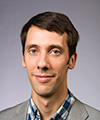
Ross Maddox
Assistant Professor of Biomedical Engineering
Ross Maddox joins the Rochester faculty from the University of Washington Institute for Learning and Brain Sciences, where he was a postdoctoral fellow.
Maddox studies the brain’s solutions to the so-called “cocktail party problem,” the remarkable ability of the human brain to adeptly focus on one sound source while tuning out numerous competing others. His research has two main thrusts: to investigate how the visual system interacts with the auditory system to improve selective attention under noisy conditions and to identify and disassociate the neural causes of disabled listening, particularly in people who show no signs of hearing impairment as defined by current audiological testing. His work combines behavioral studies, electroencephalography recordings of neural activity, and novel applications of signal processing techniques.
During his postdoctoral training, Maddox earned the Pathway to Independence Award from the National Institutes of Health and an Emerging Research Grant from the Hearing Health Foundation. He also cofounded and hosted Nerd Nite Seattle, a monthly pub lecture series that features a broad array of talks on scientific and cultural topics. He has published his research in numerous scientific journals, including Current Biology, PLOS Biology, and eLife.
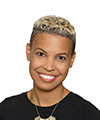
Kathryn Mariner
Assistant Professor of Anthropology
Kathryn Mariner joins the faculty after finishing a postdoctoral fellowship at the University’s Frederick Douglass Institute for African and African-American Studies.
As a cultural anthropologist, Mariner examines the intersection of race, class, and kinship in the United States through the frame of adoption and social inequality. She is currently working on a book manuscript, Contingent Kinship: The Flows and Futures of Adoption in the United States, based on her research at a private adoption agency in Chicago between 2009 and 2016. The book explores the speculative logics of adoption by attending to how raced and classed exchanges of power, money, and knowledge produce notions of the child as an imagined future. The book is based on Mariner’s doctoral dissertation, which won the Lichtstern Distinguished Dissertation Prize from the University of Chicago’s Department of Anthropology. Mariner is also trained in clinical social work and uses that background to inform her ethnographic practice.
Mariner’s teaching experience includes courses on writing, race, and social inequality. Her planned teaching for the 2016–17 academic year includes courses on the black body, kinship, reproduction, and whiteness.
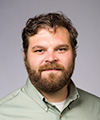
William Miller
Assistant Professor of English
William Miller joins the faculty from Johns Hopkins University, where he earned his PhD in English in 2016.
His current book project is titled Counter-Enthusiasms: The Rationalization of False Prophecy in the Early English Enlightenment. In that work, he argues that unlicensed popular prophesying in the mid–17th century necessitated a thorough revision of the link between revelation and political legitimacy, resulting in new notions of language and rationality. Miller focuses on the construction of the English language idea of “enthusiasm” and the figuration of “the enthusiast,” showing that the concepts shift the burden in detecting false prophecy from belief—“what theological positions does this purported prophet hold?”—to style—“how does this purported prophet appear, sound, and behave?” His scholarship has appeared or is forthcoming in such journals as New Literary History, Renaissance Drama, and Studies in Philology.
Miller has served as managing editor of ELH: English Literary History and has taught on 17th- and 18th-century British literature; the novel; literature and language theory; the relation among religion, science, and literature; and other topics. His research and teaching have been supported by fellowships and grants from Johns Hopkins University and the University of Texas at Austin and from the Modern Language Association and the Newberry Library.

Sergio Montero
Assistant Professor of Political Science
Sergio Montero joins the faculty from the California Institute of Technology, where he was awarded the Division of Humanities and Social Sciences Chair’s Council Fellowship.
Montero’s research interests include applied microeconomics, econometrics, industrial organization, and political economy. His current research uses structural models to explain patterns of campaign spending and elections in Mexico. He is also working on developing new machine-learning techniques for understanding electoral behavior in Mexico.
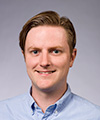
Lee Murray
Assistant Professor of Earth and Environmental Sciences
Lee Murray joins the University after conducting postdoctoral research jointly at the NASA Goddard Institute for Space Studies (GISS) and the Lamont-Doherty Earth Observatory of Columbia University.
An atmospheric chemist, he examines the coupling between the chemically reactive components of Earth’s atmosphere and its climate. He develops and uses complex three-dimensional models that resolve the spatial and temporal evolution of atmospheric composition and energy, informed by satellite and other big-data observations. His research focus to date has been on the human and climate-driven factors that alter the atmosphere’s ability to remove air pollutants and reactive greenhouse gases such as methane. One area of interest has been the role that lightning plays in influencing air quality and climate through its production of reactive nitrogen oxides, and how chemistry and climate in turn influence lightning by perturbing the physics of clouds.
He maintains ongoing collaborations with GISS and is involved with international research efforts aimed at informing the upcoming assessment report of the Intergovernmental Panel on Climate Change, an organization established through the United Nations and the World Meteorological Organization.
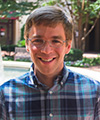
John Nichol
Assistant Professor of Physics and Astronomy
John Nichol joins the faculty after a postdoctoral fellowship in the Department of Physics at Harvard University.
An experimental condensed matter physicist, Nichol investigates the quantum mechanical behavior of nanoscale objects. He has developed new techniques for nanoscale magnetic resonance imaging, enabling precision two-dimensional imaging of organic samples with 10-nanometer spatial resolution. Nichol has also explored the use of individual electrons in semiconductors as quantum bits, or qubits, work that has applications for quantum computing. His recent work demonstrated precise entanglement or “spooky action at a distance” between individual electrons in a semiconductor, laying a foundation for a future quantum computer. Nichol has published in journals such as Nature Communications, Physical Review X, Physical Review B, and Applied Physics Letters, and he has delivered talks about his research at institutions around the world.
He received the John Bardeen Award for outstanding research in condensed matter physics as a doctoral student at the University of Illinois at Urbana–Champaign.
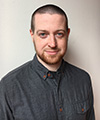
Patrick Oakes
Assistant Professor of Physics and Astronomy
Patrick Oakes joins Rochester from the University of Chicago, where he was a postdoctoral scholar as part of the Institute for Biophysical Dynamics, the James Franck Institute, and the Department of Physics.
An experimental biophysicist whose research lies at the interface of physics and cell biology, Oakes focuses on how mechanical interactions can act as signaling and regulatory mechanisms in fundamental cellular processes. Oakes applies an interdisciplinary approach that combines quantitative microscopy with computational modeling and genetic perturbations to probe mechanical interactions in systems of purified proteins, individual cells, and multicellular ensembles. His work has been published in the Journal of Cell Biology, Biophysical Journal and Physical Review Letters among other outlets.
At Rochester, Oakes aims to create a collaborative interdisciplinary laboratory that works closely with researchers from other departments, including those at the Medical Center.
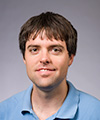
Jack Paine
Assistant Professor of Political Science
Jack Paine joins the faculty after a yearlong appointment as a postdoctoral associate in the University’s Wallis Institute of Political Economy.
Paine’s first major project examines the relationship between oil wealth and civil war from a game theory perspective. In a series of articles and papers he uses conflict bargaining models to explain why higher national-level oil wealth should decrease prospects for civil wars that aim to overthrow the government at the center—but also why oil-rich regions should be more likely to fight secessionist civil wars. His second major project examines historical causes of wars, including the long-term legacies of precolonial kingdoms, the domestic and international dimensions of colonial European settlers and decolonization wars, and the “colonial peace.” He has published articles in Comparative Political Studies, International Organization, and Journal of Theoretical Politics.
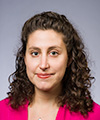
Anna Rosensweig
Assistant Professor of French
Anna Rosensweig joins the faculty after a two-year fellowship as a Provost’s Postdoctoral Scholar at the University of Southern California. As a postdoctoral scholar, Rosensweig was one of six fellows selected from more than 930 applicants across more than a dozen fields of study.
Rosensweig’s scholarship and teaching focus on early modern literature and culture, the intersections of literature and political theory, and performance studies. She is currently completing a book manuscript, Tragic Opposition: Rights of Resistance on the Early Modern Stage, in which she locates a new genealogy of rights in early modern tragedy. Rosensweig has also begun a second book, Building the Royal Body, which investigates how early modern dramas and political ceremonies align the king’s body with elements of urban architecture. She has published on early modern drama, as well as on more contemporary subjects, from symbolist theater to the ethics of representing the 1994 Rwandan genocide.
In addition to the fellowship at USC, Rosensweig’s research has also been supported by a yearlong fellowship from the Charlotte W. Newcombe Foundation. Her work has appeared in journals such as The French Review and L’Esprit Créateur. She has presented papers at scholarly conferences, including the Modern Language Association and the American Comparative Literature Association. She also co-organizes the Early Modern French Studies Reading Group, a forum of the MLA Commons.
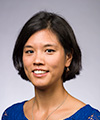
Jessica K. Shang
Assistant Professor of Mechanical Engineering
Jessica Shang joins the University following a one-year postdoctoral appointment in the Department of Pediatrics at the Stanford School of Medicine, where she was a Stanford Cardiovascular Institute Fellow.
Shang’s research focuses on the area of experimental fluid dynamics, particularly biologically inspired fluid dynamics, with applications in the interaction between flexible structures and fluid flows. Her work has applications in cardiovascular biomechanics, locomotion, environmental hydrodynamics, and the general understanding of motion in aquatic environments.
Shang has received awards recognizing her academic achievements and her scholarly work from Princeton University, the National Science Foundation, and the Gates Foundation. She is a reviewer for Physics of Fluids, AIAA Journal, and the Journal of Fluids and Structures and has been involved with teaching engineering classes at Harvard and Princeton, including computer-aided design fluid mechanics and automatic control systems.
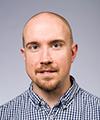
Thomas Weber
Assistant Professor of Earth and Environmental Sciences
Thomas Weber joins the University after completing a postdoctoral position at the School of Oceanography at the University of Washington.
A biogeochemical oceanographer, Weber uses numerical models to explore the links among marine ecosystems, elemental cycling, and the global climate system. His doctoral work provided insights into oceanic sources and sinks of fixed nitrogen—a critical nutrient that sustains primary production in the ocean. In his postdoctoral work, Weber explored the timescales of oceanic carbon storage as well as the transfer of carbon to the deep ocean by sinking organic particles. His work has been published in the journals Nature, Science, and the Proceedings of the National Academy of Sciences and has been recognized by awards from the Geochemical Society and the American Geophysical Union.
Weber is involved in the global GEOTRACES project, which aims to map the distributions of rare elements in the ocean and understand their cycling processes. He is designing new data-assimilating models to interpret observations from the ongoing field campaign and has received funding from the National Science Foundation to continue this work at Rochester.
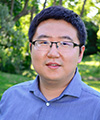
Chenliang Xu
Assistant Professor of Computer Science
Chenliang Xu joins the faculty after receiving his PhD from the University of Michigan. His research interests include computer vision, robot perception, and artificial intelligence. His work has focused primarily on the problems in high-level video understanding, such as video segmentation, activity recognition, and vision and language. His dissertation advanced the uses of supervoxel hierarchies as a new type of generic video representation in video analysis. He built the first framework for streaming hierarchical segmentation of arbitrarily long videos with constant memory. He is currently working on a book project on video segmentation.
